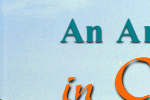 |
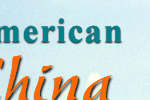 |
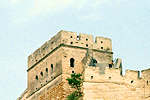 |
 |
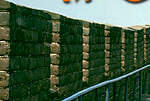 |
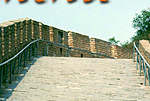 |
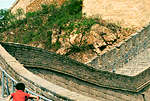 |
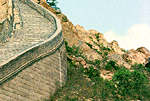 |
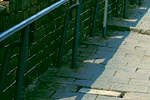 |
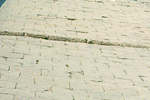 |
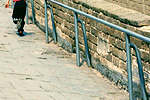 |
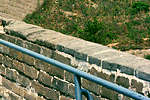 |
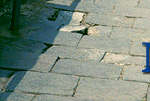 |
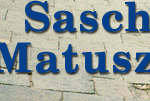 |
 |
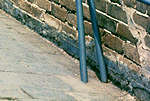 |
|
January 25, 2002 Patriotism
|
|
Krystof wrote of the gloating to be read in chat rooms and websites throughout China following Sept. 11 and the role of education and propaganda in creating a class of young Chinese intellectuals with "a chip on their shoulder." One cannot help but notice the fire in every young Chinese student's eyes when discussions turn toward China and its relationship with the rest of the world. Year after year students are told of how Japanese invaders raped, murdered and pillaged their way through China, of how the US-supported Jiang Jie Shi (Chiang Kai Shek) and took part in the torture and imprisonment of Communist patriots, of how the Chinese army defeated the Americans in Korea and drove them back across the border. What little students heard about Tiananmen Square in 1989 had to do with the death of soldiers and the role of the West in inciting rebellion. As another white-bread Falun Gong protester gets dragged out of the infamous square, nationalist sentiments harden, as do attitudes toward meddling foreigners. In class I would be asked if American culture was beautiful. My answers usually started with all that I loved, and I then qualified those answers with all that I felt was in need of improvement. I thought these questions absurd, so I asked them in return, expecting a similar response. Instead, the entire class would roar their approval and unequivocal support. In a land where self-criticisms take the place of detention in schools, there exist so very little national self-criticism. When I looked into the eyes of my students and saw their fervor and listened to them give voice to patriotism, I thought of another call and answer session I heard while studying history in school: Wollt Ihr den Totalen Krieg? JA! Meanwhile, the Rise of China is a fact drummed into the heads of all college students every time they sit and listen to yet another rendition of Deng Xiao Ping Theory and how it opened China to the world and created an economic powerhouse. Chinese students are convinced that the growing economy will propel them into superpower status, so convinced in fact, that they tend to overlook the widespread poverty keeping the majority of their countrymen in the dust and mud. And this is where the patriotism falters, stumbles and gains a perspective on itself. Today's college students know nothing of the past and hear little from the media or their parents. The period leading up to the opening of China is best forgotten and buried under massive construction sites, foreign investment and applications to foreign universities. And with the opportunities abroad that today's students have, they will most likely ignore the past and focus on a future filled with job offers, scholarships and money. What these ardent patriots leave behind is the vast majority of China: poor, ignorant and lacking in opportunity. This majority was mobilized in the 1920s after the fall of the Qing dynasty and promised a new life under Communist Rule. The literature of the 1920s coming out of China was revolutionary and threw off the yokes of decadent feudalism. Realism and hardship and the depiction of the common man was prized and encouraged. Lu Xun, alternatively hailed as a revolutionary and vilified as a counterrevolutionary led the charge toward the creation of a literature that would represent the people of China, not the leaders. All Chinese students know the book, A Dream of Red Mansions, but it seems they learn little from it. The book ridicules the excesses and whimsical rule of the Emperor and his vassals while pointing out the eternal suffering of the common Chinese. But for all its talk of Socialist Society with Chinese Characteristic, all the CCP has created is a feudalistic system with a different name and an alternating cast of Emperors. The patriotism of the students and the patriotism of the people are different. The students – beaten down by Deng Xiao Ping Theory, the People's Daily, an education system geared toward indoctrination and an economic boom that has sparked intense competition as well as high hopes – look toward a future in which their personal gain will benefit the country (i.e. get rich, be a patriot). The people, beaten down by Mao Ze Dong Theory, poverty, the Cultural Revolution and an economic boom that has sparked intense competition as well as high unemployment rates look toward a future in which their personal sacrifice will benefit the country (i.e. suffer, be a patriot). Cracks and fissures will develop in these two classes of Chinese patriots when the economic growth fails to meet the expectations of the students and alleviate the poverty of the rest of China. One can only hope the CCP will not channel their anger toward the outside. |
Text-only printable version of this article Sascha Matuszak
is a teacher living and working in China. His articles have appeared
in the South China Morning Post, the Minnesota Daily,
and elsewhere. His exclusive Antiwar.com column (usually) appears
Fridays. Archived columns
Sweep 'Em Off the Streets
Chinese Embrace Progress China's
Afghan Agenda New
War May Reveal New Superpower, Part II New
War May Reveal New Superpower A
Chance for a New Friendship? Cheating
as a Way of Life China's
Internet Generation Free
Markets or Supermarkets Sailing
Towards World Significance China's
Youth Revolution |
Please Support Antiwar.comSend contributions to Antiwar.com or
Contribute Via our Secure Server |
|
